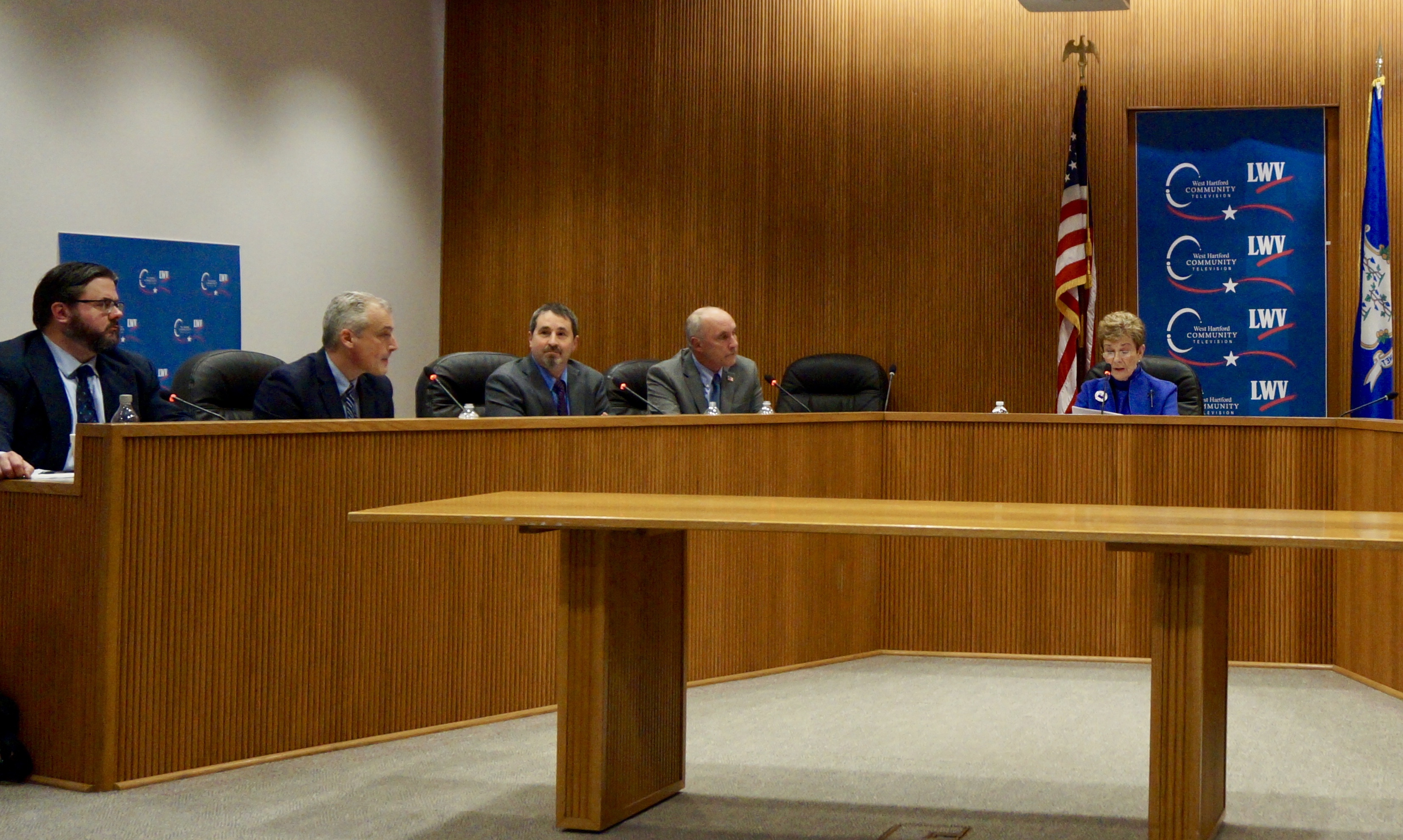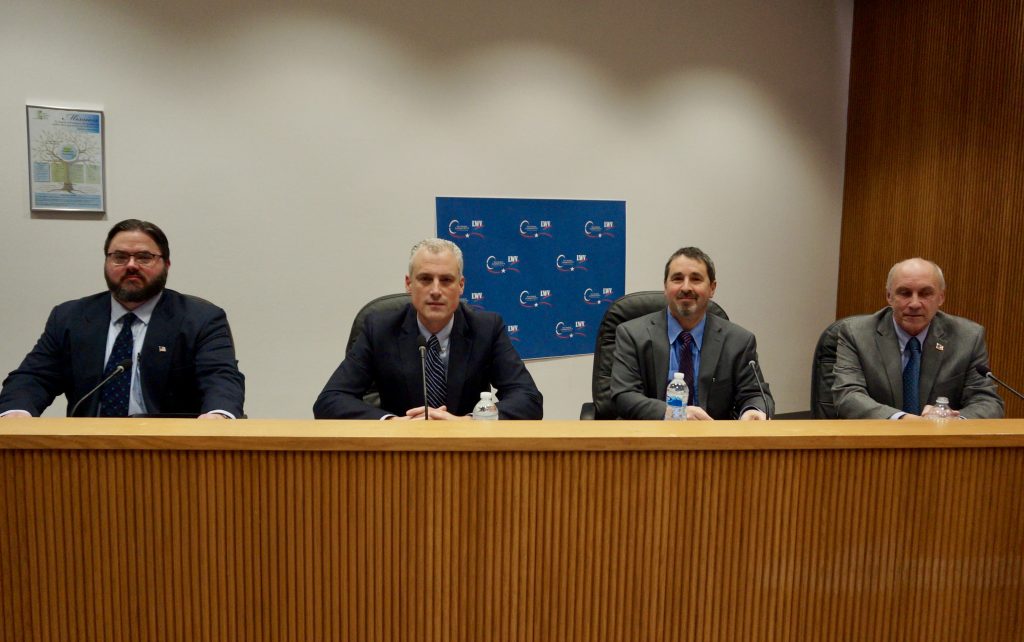5th District State Senate Candidates Engage in Debate on Multiple Issues

Audio By Carbonatix

5th State Senate District candidates (from left) Jeff Przech, Derek Slap, Mark Stewart Greenstein, and Bill Wadsworth engaged in a debate moderated by Carole Mulready of the League of Women Voters. Photo credit: Ronni Newton
All four of the candidates running in the Feb. 26, 2019, special election for the 5th State Senate District participated in a debate Friday at West Hartford Town Hall.

5th State Senate District candidates (from left) Jeff Przech, Derek Slap, Mark Stewart Greenstein, and Bill Wadsworth. Photo credit: Ronni Newton
By Ronni Newton
The four candidates whose names will appear on the ballot in the Feb. 26 special election for the vacant 5th District State Senate seat engaged in a debate Friday night, sharing their views on a variety of issues that are important to voters.
The four candidates are: Democrat Derek Slap of West Hartford, Republican Bill Wadsworth of Farmington, Jeffrey P. Przech of Farmington, a Libertarian who was endorsed by the Independent Party, and Mark Stewart Greenstein of West Hartford, a registered Democrat and petitioning candidate running as a member of the Amigo Constitution Liberty Party.
They debated on topics ranging from macro issues such as new sources of revenue to assist with the state’s budget and proposed regionalization of school districts, to very specific issues such as the candidates’ opinion on a 50 percent ammunition tax proposed by 18th District State Rep. Jillian Gilchrest of West Hartford last week.
While there were a few issues on which the candidates agreed, they diverged in their views about how to deal with the state budget.
“We have for first time in memory a bipartisan budget. We had both parties come together and make really tough decisions,” said Slap, who is currently in his second term as a State Representative for the 19th District. He said the the legislature came together to protect the towns and the educational system, and it is “important to continue that paradigm at the Capitol,” to continue to reach across the aisle.
As for solving the state’s budget shortfalls, Slap said, “We need to scour every agency for budget cuts.” Enhancing revenue “should be part of the mix as well.”
“I don’t think that revenue is generally the answer in this situation,” Wadsworth said. A former Republican State Representative in the 21st District, he noted that there continues to be a $2 billion shortfall despite increased revenue through tax hikes that was supposed to solve it, and he thinks that’s going to happen again.
“I think it needs to be solved by a reduction in cost, the size of government, and work our problems out that way,” said Wadsworth. And he added that he believes tolls are taxes.
“I’m a proponent of legalizing both marijuana and sports betting,” said Przech. “As a Libertarian, that’s part of our core beliefs,” he said. On the first day that Massachusetts had legalized sale of recreational marijuana, $440,000 raised and that translated to $74,800 in revenue for the state in just one day.
“So many Connecticut residents are shooting up to Northampton [to buy pot] on 91 to spend tax dollars there that could be spent here,” he said.
As for sports betting, Przech said, “No matter how you choose to tax or regulate that, as far as I’m concerned it’s easy money for Connecticut.”
“Ladies and gentlemen we have a spending problem, we don’t have a revenue problem,” said Greenstein. He said that for 40 years the administration has been talking about looking for budget cuts, and proposed cutting “the easiest 20 percent” and funding it privately.
The easiest cuts would be to areas that would attract private funding, like firefighters and “homes for autistic children,” Greenstein said. “I’d like to see a slimmed-down governance so that what’s left can be done better.”
Regarding a constitutional amendment to allow additional options for voting – either early voting or the expansion of the use of absentee ballots, Wadsworth said that the right of people to vote “should be protected at all costs.” He said he favors an expansion if it allows more solid voters to to cast their ballot.
Przech said that it’s important to ensure the proper identification of voters, but he has no problem with an expansion.
Greenstein had a different opinion, and while he said that expanding voting opportunities is not high on his list of concerns, he’s somewhat against it. “Voting day used to be somewhat celebratory,” he said. “I don’t like good civics getting watered-down with a little element of convenience.”
Greenstein added that he is more concerned with having more “concerned” and knowledgeable people vote as opposed to just more people in general vote.
Slap expressed his very passionate opinion about the need to expand voting opportunities, and said that it’s dangerous to determine who is knowledgeable and who is not. “The way Connecticut votes right now is shameful. We disenfranchise folks,” he said.
“We should not only have early voting we should have automatic voter registration for, of course, people who are eligible to vote,” he said, without extra hoops to jump through that tend to unfairly disenfranchise people in urban areas.
“We see that the federal government has impact on voting rights … and I think every vote matters and we need to do a much better job ensuring that it’s easy to vote in Connecticut,” Slap said.
All four candidates agreed that special funds, like PEGPETIA (the Public, Educational and Governmental Programming and Educational Technology Investment Account) and transportation monies should not get swept into the general fund, but they disagreed about an audience-posed question about taking another crack at getting Amazon to open another headquarters in Connecticut now that the company has scrapped its plans for Long Island City.
Greenstein held up a piece of paper, and said that 20 months ago he had proposed that Amazon locate its headquarters at Bradley Airport. He submitted his proposal again on Friday, he said.
“We could use huge help,” Greenstein said, and while Amazon may be beyond Connecticut’s reach, we “should be going after divisions of other companies to land them here,” especially in light of the president’s trade antipathy.
“Absolutely we should go after Amazon, but it’s not just about Amazon it’s about strengthening our economy,” Slap said. He said he doesn’t want to see the younger generation leaving the state for job opportunities.
Slap said that Connecticut is strategically located, but we need growth and job opportunity. To do that, “we need to have a balanced, affordable. sustainable budget, and we need to make smart investments in transportation and higher education – public education … We need growth and I’m wiling to roll up my sleeves to do it.”
Noting the successful passage of the pay equity bill that he sponsored last year, Slap said that Connecticut also needs to become a premier state for working women, which will benefit the economy.
Wadsworth said that the problem in the state is that businesses are taxed too much, and grants to lure businesses are not the solution. “I don’t think we should sell the company store,” said Wadsworth, but rather help all businesses.
Przech joked that the state should go after Amazon “only if we build it in the 5th District,” but added that he thought New York made a big mistake. “Yes, I would love to see Connecticut go after Amazon but not give away an arm and a leg to get them there,” adding that the state needs to be friendlier to business in general.
While he believes that paid family leave can be a good thing, Przech said that he think a minimum wage is “unconstitutional. I think it hurts small businesses more than it helps them.”
Slap, Wadsworth, and Przech all said they are amenable to some type of legislation to cut down on single-use plastic bags, but Greenstein, taking a Libertarian position, said we don’t need government to do good things. “I think government should be a backstop, not the front,” he said.
Wadsworth said that regionalizing school districts “doesn’t sit well with me,” and Przech said he would favor it only if the towns could decide themselves how to do it. “I think what we need are more charter schools,” Przech said, to allow families to decide what’s best for their children.
“Regionalism is dangerous,” Greenstein said. He said if he isn’t elected to the State Senate, he’d like a seat on the West Hartford Town Council just to resist regionalism – which is accompanied by “a thuggish, from-the-top mentality.”
“I opposed forced regionalization of school districts,” said Slap. While he said that the concept makes sense for some services and can be a way to save property taxes, like the current West Hartford-Bloomfield Health District, forcing school districts to merge is not something he supports.
All four candidates denounced ethnic and racial discrimination, and Slap, Wadsworth, and Przech agreed on the need for a strong consumer protection agency at the state level. Greenstein said that the “best consumer protection is free market, free choice.”
In response to a question about underfunding of the Educational Cost Sharing (ECS) grant by the state, Slap said that both Democrats and Republicans had fought to protect ECS in last year’s budget. “I’m committed to doing that, my record shows that,” he said, adding that he will continue to fight hard for fair funding for all towns in the district.
Wadsworth said that free public education is a right, but somehow has come to fall on the backs of the municipalities. “The fact that [ECS] is not fully-funded should be corrected,” he said, noting that the towns in the 5th district pay hundreds of millions of dollars in taxes and get very little back.
Przech, who teaches at Northwest Catholic High School, said he moved to Farmington for the quality of the schools, and that continuing ECS is imperative. Cutting spending is important to be able to fund it, he said.
“Here’s dopey government at work again,” said Greenstein, noting that the administration can’t agree to keep something for even two straight years. He said he doesn’t think West Hartford will ever get an ECS increase.
A discussion of the proposed 50 percent tax on ammunition turned into a discussion about the second amendment and gun control.
Wadsworth said that the second amendment gives citizens the right to bear arms, and noted that the state constitution is even more specific. “The tax on ammunition is a penalty tax in my view,” he said, and should not be higher for some types of products.
Przech said that while he is not a gun owner, he is a big proponent of the second amendment. “I do think that proposing a 50 percent sales tax on ammunition is violation of the second amendment of the U.S. constitution and a violation of the state constitution,” he said adding that he believes violence is a societal problem. He added that he thinks it’s “deplorable” that our U.S. senators sensationalize tragedy for the purpose of furthering a gun control agenda.
Greenstein said that while Gilchrest’s proposal is well meaning, but while “none of us wants to see more violence … if God forbid there was a shooter in here, in this room taking out people, I think most of would be relieved that there were some well-armed civilians able to take that shooter down.” He said that people have the right to protect themselves and their families because the police can’t be everywhere.
Slap said that he’s not sure how the 50 percent figure specifically came to be, but “I do think there are some things we can do at the state level, in the legislature, this year to improve public safety, gun safety,” noting that banning ghost guns is one of them, along with safe storage.
“This is one of those areas where there are some real differences … Mr. Wadsworth got a passing grade from the NRA; that’s a test that I am going to fail pretty much every time,” Slap said.
The candidates each had the opportunity to offer a two-minute closing statement.
“I think what we are in danger of doing here is having people choose party instead of person,” Przech said. “What I am asking you to do here is vote for a person … a man of integrity who will always keep your best interests in mind and at heart,” a truly independent candidate.
Wadsworth said that back in 1990, the state’s 3.5 million people supported a budget of $7 billion, and now the 3.5 million people have to support a budget of more than $20 billion. “We have not grown our population as we should have,” he said and have already lost one congressional seat.
While we have good education, we don’t do a good job of creating jobs to employ our children, Wadsworth said. “I would support a smaller government … one that focuses on the fundamentals: education, public safety, public health and transportation.” He said he is a “fiscal conservative Republican.”
Slap said that his father was a minister and his mother a nurse, and growing up the expectation was always that family members “would find meaningful ways in our life to give back and to help others, and it has been my profound honor to have been a state representative for the last two years.” He said he has devoted himself to reaching across the aisle and helping people.
Slap relayed a story of a family that approached him because their daughter had a life-threatening peanut allergy and they were afraid to let her ride the school bus because she could not bring an epipen on the bus and the bus driver could not be trained to administer it. He said he worked very hard with legislators from both parties, and they stood up to the bus industry.
When the legislation was passed requiring bus drivers to be trained to administer epipens, “I and a team of folks were able to deliver for that family,” Slap said. Public service is about “lifting other people’s voices up, it’s working together, it’s working beyond labels … and not seeing people who may be different as ‘other.'”
Greenstein said that every Democrat in the room shares the same values, including better education, helping the poor, allowing single moms to thrive, but there’s a wing of Democrats in the state – the “Josh Elliot wing” – who are dangerous. “Their proposals are dangerous because their proposals are going to bankrupt Connecticut, leave less likelihood of new businesses wanting to come. Minimum wage sounds nice but it hurts the people who need it the most.”
Greenstein said, “I am a Democrat but I’m your father’s Democrat,” he said. He said that the party he started, the Amigo Constitution Liberty Party, is “here to make better candidates.”
Friday’s debate was hosted by the League of Women Voters of Greater Hartford and West Hartford Community Television (WHC-TV). Carole Mulready, chair of Voter Services and immediate past president of the League’s local chapter, moderated the modified cumulative time limit format debate, during which each candidate was given 13 minutes to speak – including a closing statement.
WHC-TV live-streamed the debate, and it can be viewed in its entirety on their YouTube channel, and will also be replayed on the station on weekdays at 10:30 a.m. and 5:30 p.m., through the special election day. For more information, visit WHC-TV’s website.
The candidates will have two additional opportunities to debate in advance of the special election.
On Sunday, Feb. 17, a debate will be held at Beth David Synagogue, 10 Dover Rd., West Hartford. The debate will last from 1-2:30 p.m., and is sponsored by The Government Information Forums. It will be moderated by WFSB Channel 3 reporter Susan Raff.
Registration is required for the Feb. 17 debate, and those who would like to attend should email [email protected].
A final opportunity for the candidates to debate will take place on Wednesday, Feb. 20, at Farmington High School, 10 Monteith Dr., Farmington.
The Feb. 20 debate will be co-hosted and moderated by the Farmington High School Political Action Club and Student Council. For more information, contact Lance Goldberg at [email protected].
All four candidates have also submitted profiles to We-Ha.com. Click on their names below to access their candidate profile information.
Like what you see here? Click here to subscribe to We-Ha’s newsletter so you’ll always be in the know about what’s happening in West Hartford!



